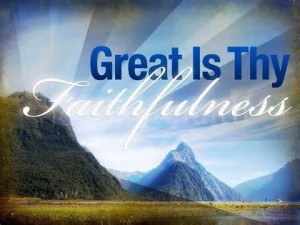Notes on the Notes – September 25, 2016
This week’s theme:
I Can’t Even Imagine!
This week’s scripture readings:
1 Tim. 6:6-19 Luke 16:19-31
This week’s music:
“All Things Bright and Beautiful” (VU #296)
This beloved text, from Cecil Frances Alexander’s Hymns for Little Children (1846), is based on the phrase “Maker of heaven and earth” in the Apostles’ Creed. The new words for verse four are particularly apt in the Canadian context. The tune, ROYAL OAK, is an English traditional melody associated with the restoration of the Stuart monarchy in 1660. The arrangement in Voices United is by Martin Shaw (1915). The editors of Voices United also changed the words slightly in the interest of inclusivity.
“All things bright and beautiful,
all creatures great and small,
All things wise and wonderful
in love, God made them all.
Each little flower that opens, each little bird that sings,
God made their glowing colours, God made their tiny wings.
The purple-headed mountains, the river running by,
the sunset and the morning that brightens up the sky.
The cold wind in the winter, the pleasant summer sun,
the ripe fruits in the garden: God made them every one.
The rocky mountain splendor, the lone wolf’s haunting call,
the great lakes and the prairies, the forest in the fall.
God gave us eyes to see them, and lips that we might tell
how great is God our maker, who has made all things well.”
Hear boys’ choir Libera sing a version of the hymn at: https://www.youtube.com/watch?v=yUl6TVnpi1M
“Great is Thy Faithfulness” (VU #288)
“Great is thy faithfulness, God our Creator;
There is no shadow of turning with thee;
Thou changest not, thy compassions, they fail not;
As thou hast been thou forever wilt be.
Great is thy faithfulness!
Great is thy faithfulness!
Morning by morning new mercies I see;
All I have needed thy hand hath provided.
Great is thy faithfulness, ever to me!
Summer and winter and springtime and harvest,
Sun, moon, and stars in their courses above
Join with all nature in manifold witness to thy great faithfulness, mercy, and love.
Great is thy faithfulness!…
Pardon for sin and a peace that endureth,
Thine own dear presence to cheer and to guide,
Strength for today and bright hope for tomorrow –wondrous the portion thy blessings provide.
Great is thy faithfulness!…
Thomas O. Chisholm, a Methodist minister, wrote the poem in 1923 about God’s faithfulness over his lifetime. William Runyan set the poem to music, and it was published that same year and became popular among church groups. The song was exposed to wide audiences after becoming popular with Dr. William Henry Houghton of the Moody Bible Institute and Billy Graham who played the song frequently on his international crusades. The version in Voices United is from the Hymnal of the Evangelical United Brethren (1957).
Listen to Chris Rice singing this hymn at http://www.youtube.com/watch?v=0k1WhFtVp0o
Hear an instrumental version of the hymn at: https://www.youtube.com/watch?v=MoFJzsEF3ZM
See a Sam Robson acapella version of the hymn at: https://www.youtube.com/watch?v=X3iwZ3Ym2BE
“Take Time to Be Holy” (VU #672)
“Take time to be holy, speak oft with your Lord;
Abide in him always, and feed on his word.
Make friends of God’s children, help those who are weak,
Forgetting in nothing his blessing to seek.
Take time to be holy, let him be your guide,
And run not before him, whatever betide.
In joy or in sorrow, still follow the Lord,
And, looking to Jesus, still trust in his word.
Take time to be holy, be calm in your soul,
Each thought and each motive beneath his control.
Thus led by his spirit to fountains of love,
You soon shall be fitted for service above.”
William D. Longstaff, an English businessman, wrote this hymn at an annual Keswick Convention in response to an account of the work of Griffith Jones, a missionary in China who was reported to have been preaching on the subject of holiness. The Keswick Convention, which has met annually since 1875, is a gathering of evangelical Christians in Keswick, in the English county of Cumbria. The composer, George C. Stebbins, wrote the tune while working on an evangelical campaign in India; it was published in 1890.
Hear the Dallas Christian Adult Concert Choir at: https://www.youtube.com/watch?v=rFApbg-wcmE
“Knowing You”
“All I once held dear, built my life upon
All this world reveres, and wars to own
All I once thought gain I have counted loss
Spent and worthless now, compared to this
Knowing you, Jesus
Knowing you, there is no greater thing
You’re my all, you’re the best
You’re my joy, my righteousness
And I love you, Lord
Now my heart’s desire is to know you more
To be found in you and known as yours
To possess by faith what I could not earn
All-surpassing gift of righteousness
Oh, to know the power of your risen life
And to know You in Your sufferings
To become like you in your death, my Lord
So with you to live and never die”
This week’s anthem is a song written by worship leader and songwriter Graham Kendrick. On his website he says:
“A major Christian conference in the UK had circulated a number of songwriters asking them to consider writing specific material to accompany the Bible readings and teaching at their event the following year. The book of Philippians had been chosen, so in order to begin the process of seeking inspiration I began to read through the book meditatively, asking God to draw my attention to anything which might become the seed of a song. I had come to the famous passage where Paul lists his impressive qualifications, and then dramatically sweeps them all aside for the sake of one supreme aim – to know Christ.
At this point my heart was stirred by the theme of knowing Jesus, and in an attempt to make it a personal song directed to him, I began to experiment with the phrase ‘knowing you’ as the moment of release of the song. Having written the chorus I set out to paraphrase the key verses of the scripture text into a singable form. This is always a great challenge because of course no translation of the Bible rhymes and scans, and there is always a danger that in shaping a lyrical form something is lost. After all this is the Word of God that we are dealing with!
Eventually, and with some editing input from one of our church leaders, plus some private ‘road testing’at my home church, the song was finished. I know of several people who have learned the song without realising where it is derived from and have commented “Graham, I found your song in the bible!”.
For me one of the most important things about it is the theme of sharing in Christ’s sufferings (in the third verse), and of dying and rising with Christ. Perhaps for this reason the song has featured at funerals as well as in regular worship services. It has found its way into wedding services too where couples wish to express their commitment to putting Christ first in their marriage. ‘Knowing You’ has rapidly risen to be one of the most popular songs in the UK churches, at one time reaching number 5 in the CCLI chart.” (Source: http://www.grahamkendrick.co.uk/songs/stories-behind-the-songs/item/16-story-knowing-you-all-i-once-held-dear)
See Graham Kendrick sing the song at: https://www.youtube.com/watch?v=sotCi7St0fA
“God Says” (MV #172)
God says, “Be still so you may hear the words I whisper in your ear.
If you will listen, you will know I’m with you always where you go.”
 God says, “Look up and see the prize I’ve placed here right before your eyes.
God says, “Look up and see the prize I’ve placed here right before your eyes.
Find beauty in the things of earth, a cause for wonder and rebirth.”
God says, “Come here! I need your voice. Please teach my people to rejoice.
In who you are, in what you do, your life will show my love for you.”
God says, “Reach out! The world’s in need and wants a word, a song, a deed.
I send you forth to speak, to sing, to act for Christ in everything.”
The words and music for this hymn were written by Mary Bittner in 1993. Mary Bittner was a native of Pennsylvania and received a B.S. in music education from Penn State University. She taught piano, organ, clarinet, and school music, and also served as music director and/or organist in Baptist, United Methodist, and Presbyterian churches and a U.S. Air Force Base Protestant chapel. She began writing hymns in 1990 while enrolled in a church music degree program. She received her Master of Theological Studies in church music in 1993, the same year she began attending hymn writing workshops and conferences of the Hymn Society in the United States and Canada.


You must be logged in to post a comment.